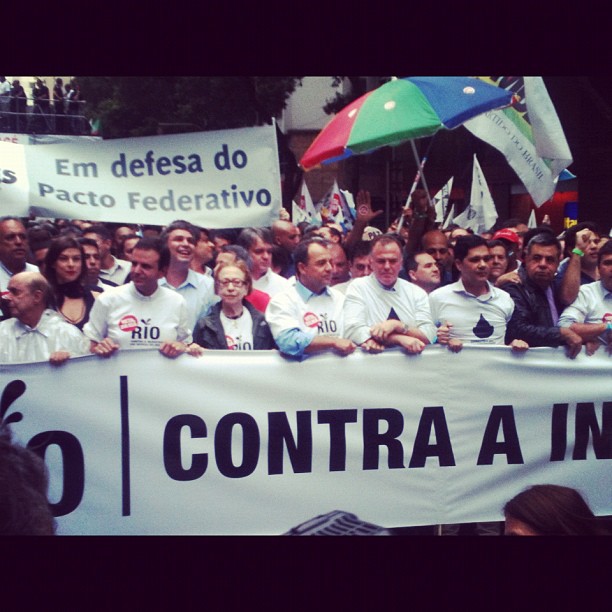Rio’s politicians mounted a cleverly-staged piece of political street theatre last week, in order to drive home the message that the state’s residents wants to keep oil royalties for themselves. It worked.
By Dom Phillips
According to police, some 200,000 people turned up to Sérgio Cabral’s demonstration on Monday in opposition to a new bill that would mean Rio gets less money from oil royalties. And the Rio de Janeiro state governor kept them all waiting.
200,000 is a lot of people – an explosion of popular support, you might think. But though Cabral and Mayor Eduardo Paes to enjoy popular support, this was more a cleverly-staged piece of political street theatre, paid for and organized by the state, its numbers swelled by public employees from cities in Rio state whose budgets would have been affected.
A couple of city employees from Rio das Ostras in the omnipresent demonstration T-shirts told me they were getting their usual salaries for the day and that the mayor had provided three busses. “This is work,” shrugged one.
Both Rio de Janeiro and Espirito Santo states earn good money from the oil produced in them and off their coasts – the rest of Brazil’s states want a share of that. It’s a stand-off that’s been going on for a year. This was the third such demonstration in Rio.
Politically, the situation is becoming urgent: in September the government announced long-delayed bidding rounds on new oil concessions for May and November next year – and it needs the oil royalties law passed to do that.
In November Congress finally passed a bill that’s been around a year – but in it, both states will lose money: in Rio’s case, it says, R$3.4 billion in 2013 alone, R477 billion by 2020. They wanted President Dilma Rousseff to veto part of the bill so they’d at least keep getting money on existing contracts. Consequently the demonstration was called: Veta Dilma, or ‘veto it, Dilma’.
Official billboards covered Rio in the days before the demonstration. There were even special free-standing posters at metro stations. The whole shebang was lined up around four sound trucks by 2pm Thursday – much like a carnival, just lacking fancy dress, beer sellers, and that all-important carnival atmosphere. Difficult to stoke up on a drizzly workday Monday, no matter how much shouting you do. Instead it felt more like a strike, as organizers sent squads of protestors in matching T-shirts to their spots.
The anti-royalties carnival did not start rolling until 4.30pm or so, by which time we’d been bombarded with ear-splitting pop and unidentified voices trying to get us to shout “Veto it, Dilma!” for a couple of hours. As Cabral, mayor Eduardo Paes, Espirito Santo governor Renato Casagrande, who were wearing pro-demo T-shirts, and actress Fernanda Montengro, who had a jacket over hers, walking behind a giant hand-held banner, it rumbled off.
In front of the politicians, themselves in front of 200,000 people, was a moving, cordoned off area for press. Within this, a truck with an upper level for photographers to get the scale of the event. But this was not an easy caravan to coordinate, so at times the truck of photographers stopped and the rest didn’t, leaving the press sandwiched between.
Then a group of Brazilian Indians, currently squatting the disused Indian Museum which is to be knocked down because it’s next to the by the Maracanã World Cup stadium and they want to build a car-park or something, crashed into one side of this enormous crocodile of people.
The politicians and Ms Montengro, press, carrying their cameras and bags, and security, all shoving, smiling and shouting, were suddenly rushing backwards and forwards, diverted away from the main march and hustled into the town hall.
Later on, Cabral and Casagrande did a crowded press conference – and the Rio governor had backed down on his previous threats to cancel the Olympics and World Cup, focusing on the veto. The crowd was entertained by Brazilian musicians and singers. Everybody got a day off. There were no speeches, just the reading of a ‘manifesto’. It looked great on television: no damp atmosphere, just colour and crowds.
The president announced Friday she is vetoing just those parts of the bill that Rio wanted: the state will keep getting the revenues it’s been getting from existing contracts. 100% of future royalties will be invested in education, the government said. Cabral’s political street theatre has had its pay-off. The State of Rio de Janeiro thanks president Dilma, it said in a statement.
Photo by Dom Phillips


